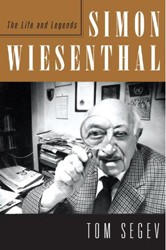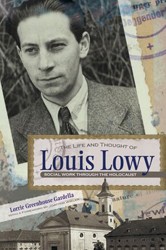By
– June 5, 2013
Pére Marie-Benoit was recognized by Yad Vashem as a Righteous among the Nations in 1966 and given the award at a ceremony at the Israeli embassy in Paris in November 1967. This French Capuchin priest, working in cooperation with Jewish-Christian rescue networks in France and Italy during the Nazi occupation of both countries, saved the lives of at least twenty-five hundred men, women and children, most of them refugees without resources in a nation controlled by the Nazis determined to annihilate them.
Susan Zuccotti, the author of this scholarly biography of the courageous Capuchin priest, has written extensively about the Holocaust in both France and Italy and is among a number of Catholic historians critical of the role of Pope Pius XII in regard to his response to the deportation of Italy’s Jews to Auschwitz. Based on her work in both the French and Vatican archives, interviews with her subject, and the testimony of survivors who owed their lives to Marie-Benoit and his rescue organizations, this work is more than a biography of Marie-Benoit; it also informs us about a neglected area of Holocaust studies, the efforts to rescue Jews in the West. Zuccotti points out that although rescue organizations existed in all German-occupied territory, in countries such as Italy and France a number of conditions had to exist if they were to prove successful. Paramount was the cooperation of both Jews and non-Jews in rescue operations. Unlike Central and Eastern Europe, where cooperation between Jews and Gentiles was difficult because of pervasive anti-Semitism, in the West there was a greater willingness on the part of the non-Jewish population to help Jews find safe-houses, provide clothing and medicine. In the case of Marie-Benoit, in both Marseille and Rome, he worked closely with like-minded people, mostly Jewish but also non- Jews to find safe-houses and, above all, false identification papers that protected Jews from deportation.
Although Marie-Benoit was aided by a number of the Capuchin’s French Catholic communicants, the reality is that all he accomplished was done without support from the Vatican. Zuccotti informs us that Marie-Benoit received a cold reception in his one meeting with Pius XII, who declined to assist in the priest’s efforts. Nevertheless, until the end of the war, Marie-Benoit persisted in his clandestine efforts to save Jewish lives.
This biography is a welcome addition to our understanding of the rescue efforts in behalf of Jews by righteous Christians like Marie-Benoit and the Jewish rescue networks with which he worked.
Susan Zuccotti, the author of this scholarly biography of the courageous Capuchin priest, has written extensively about the Holocaust in both France and Italy and is among a number of Catholic historians critical of the role of Pope Pius XII in regard to his response to the deportation of Italy’s Jews to Auschwitz. Based on her work in both the French and Vatican archives, interviews with her subject, and the testimony of survivors who owed their lives to Marie-Benoit and his rescue organizations, this work is more than a biography of Marie-Benoit; it also informs us about a neglected area of Holocaust studies, the efforts to rescue Jews in the West. Zuccotti points out that although rescue organizations existed in all German-occupied territory, in countries such as Italy and France a number of conditions had to exist if they were to prove successful. Paramount was the cooperation of both Jews and non-Jews in rescue operations. Unlike Central and Eastern Europe, where cooperation between Jews and Gentiles was difficult because of pervasive anti-Semitism, in the West there was a greater willingness on the part of the non-Jewish population to help Jews find safe-houses, provide clothing and medicine. In the case of Marie-Benoit, in both Marseille and Rome, he worked closely with like-minded people, mostly Jewish but also non- Jews to find safe-houses and, above all, false identification papers that protected Jews from deportation.
Although Marie-Benoit was aided by a number of the Capuchin’s French Catholic communicants, the reality is that all he accomplished was done without support from the Vatican. Zuccotti informs us that Marie-Benoit received a cold reception in his one meeting with Pius XII, who declined to assist in the priest’s efforts. Nevertheless, until the end of the war, Marie-Benoit persisted in his clandestine efforts to save Jewish lives.
This biography is a welcome addition to our understanding of the rescue efforts in behalf of Jews by righteous Christians like Marie-Benoit and the Jewish rescue networks with which he worked.
Jack Fischel is professor emeritus of history at Millersville University, Millersville, PA and author of The Holocaust (Greenwood Press) and Historical Dictionary of the Holocaust (Rowman and Littlefield).





